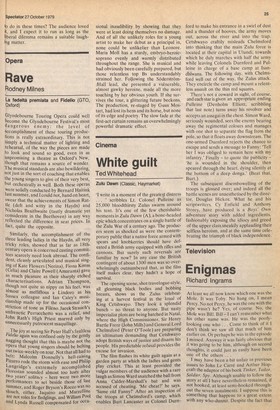Opera
Rave
Rodney Mines
La %delta premlata and Fidelio (GTO, Oxford) Glyndebourne Touring Opera could well become the Glyndebourne Festival's most dangerous enemy: the level of accomplishment of these touring productions is really extraordinary. This is not simply a technical matter of lighting and rehearsal, of the way the pieces arc made to look and sound so good, even in as Unpromising a theatre as Oxford's New, though that remains a source of wonder. The musical standards are also bewildering, not just in the sort of coaching that enables the young singers to give of their very best, but orchestrally as well. Both these operas were solidly conducted by Bernard Haitink last summer, and I could not, hand on heart, swear that the achievements of Simon Rattle (deft and witty in the Haydn) and Nicholas Braithwaite (tautly dramatic yet considerate in the Beethoven) in any way reflected the difference in seat prices. In fact, quite the opposite.
Similarly, the accomplishment of the three leading ladies in the Haydn, all very tricky roles, showed that as far as 18thcentury opera is concerned casting committees scarcely need look abroad. The confident, cleanly articulated and musical singing of Kate Flowers (Nerina), Fiona Kimm (Celia) and Claire Powell (Amaranta) gave as much pleasure as their sharply etched characterisations. Adrian Thompson, though not quite so nippy on his feet, was almost as melliflous a Lindoro as his Sussex colleague and Ian Caley's musicianship made up for the occasional constriction of tone as Filen°. Jacek Strauch's unfrenetic Perrucchetto was a relief, and John Rath's High Priest marred only by unnecessarily putrescent maquillage.
The joy at seeing Sir Peter Hall's faultless Fidelio again was confined only by the gently nagging thought that this is maybe not the opera that young singers should be belting out twice-weekly on tour. Not that all had to belt: Malcolm Donnelly's hell-raising Pizarro rode the storm with ease and Philip Langridge's extremely accomplished after Florestan sounded almost too lusty two years' solitary — here were two more performances to set beside those of last summer, and Roger Bryson's Rocco was no Slouch, either. Jaquino and Marzelline are not roles for fledglings, and William Pool and Lynda Russell compensated for occa sional inaudibility by showing that they were at least doing themselves no damage. And of all the unlikely roles for a young artist to make her debut as a principal in, none could be unlikelier than Leonore. Maria Moll has a sturdy, embryo-heroicsoprano evenly and warmly distributed throughout the range. She is musical and had obviously been carefully prepared, but those relentless top Bs understandably strained her. Following the Soderstrom/Hall lead, she presented a vulnerable, almost gawky heroine, made all the more touching by her obvious youth. If she survives the tour, a glittering future beckons. The production, re-staged by Guus Mostart, had lost its hens and its horse, but none of its edge and poetry. The slow fade at the first-act curtain remains an overwhelmingly powerful dramatic effect.


































 Previous page
Previous page